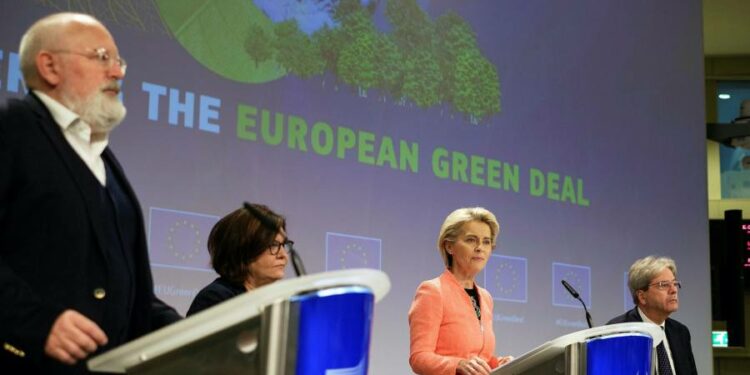The EU needs to spend almost €200bn in the next five years in its bid for energy independence from Russia, according to draft plans that set out aggressive targets in areas including clean energy and lowering consumption.
A draft of the upcoming RepowerEU proposals from the European Commission, seen by the Financial Times, shows Brussels expects extra investment of €195bn between now and 2027, on top of plans to boost spending on carbon reduction. The EU will also need to cut energy consumption more than previously thought to meet ambitious net zero carbon emissions targets by 2050.
The proposals will be published next week as EU leaders rush to wean their economies off Russian oil and gas following President Vladimir Putin’s invasion of Ukraine. The commission has already said it thinks the EU could drive down Russian gas imports by two-thirds this year, and has urged member states to replenish their gas storage facilities ahead of next winter.
It is also seeking member state approval for a sixth package of sanctions including a phased-in embargo on Russian oil this year. The measures have been held up by opposition from Hungary, which relies heavily on Russian oil.
The proposals are about “rapidly reducing our dependence on Russian fossil fuels by fast-forwarding the clean transition and joining forces to achieve a more resilient power system and a true Energy Union,” the commission’s draft says.
It calls for a reduction of 13 per cent in energy consumption by 2030, compared with a 9 per cent cut in the previous energy efficiency directive proposal.
Brussels is also seeking to speed up deployment of renewable energy, aiming for renewables to cover 45 per cent of all energy demand by 2030, compared with a target until now of 40 per cent. This requires more than doubling current capacity of 511 gigawatts to reach 1,236GWh.
The document sets out a strategy to accelerate the installation of solar photovoltaic capacity by 2028 to more than twice today’s level. It also calls for greater use of heat pumps, geothermal and solar thermal energy.
Wind farm construction, often held up by local objections, needs to be “drastically accelerated,” it says.
The commission also wants to see a boost to hydrogen use with 20mn tonnes of renewably generated hydrogen by 2030, half of it imported.
It will subsidise the gap between production costs and sales prices for renewable hydrogen generated in the EU and overseas.
A draft international energy strategy, also seen by the FT, proposes three “hydrogen import corridors” via the Mediterranean, North Sea and, eventually, Ukraine. The strategy also relies on increased use of biomethane at a cost of €36bn.
Alongside this, the EU will need to find ways of lowering European industry’s reliance on natural gas. Measures to increase energy efficiency, explore fuel substitution, boost electrification, and use more renewable hydrogen and biomethane could save up to 35 billion cubic metres of natural gas by 2030, it says.
Infrastructure for LNG import terminals and pipelines will need to be improved. The EU’s power grid could also require an additional €29bn of investments, the draft document says.
The communication, which would require changes to several EU directives, could be revised before May 18, when it is published along with proposals to boost hydrogen and renewable energy. The latter include relaxing environmental regulations by letting companies in the EU build wind and solar projects without the need of an environmental impact assessment.











